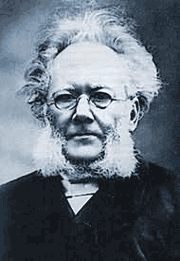On this date in 1828, Henrik Ibsen was born in Norway. The playwright, a social critic who in his later years pioneered realist drama, produced a roster of literary classics. His plays include “Brand” (1866), “Peer Gynt” (1867), “A Doll’s House” (1879), “Enemy of the People” (1882) and “Hedda Gabler” (1890). Reportedly becoming a freethinker as a teenager, Ibsen was later influenced by Georg Brandes, penning “The Emperor and the Galilaean” (1873). Its disillusioned protagonist sets out to overthrow Christianity.
In his play “Ghosts” (1881) he wrote, “It’s not only what we have inherited from our father and mother that walks in us. It’s all sorts of dead ideas, and lifeless old beliefs, and so forth. They have no vitality, but they cling to us all the same, and we can’t get rid of them.” In “The Pillars of Society” (1877) he wrote, “The spirit of truth and the spirit of freedom — these are the pillars of society.”
Ibsen married Suzannah Thoresen when he was 30 and had a son, Sigurd, who as prime minister played a central role in 1905 in the dissolution of the union between Norway and Sweden. He died at home in Oslo at age 78, six years after the first of a series of strokes. (D. 1906)


